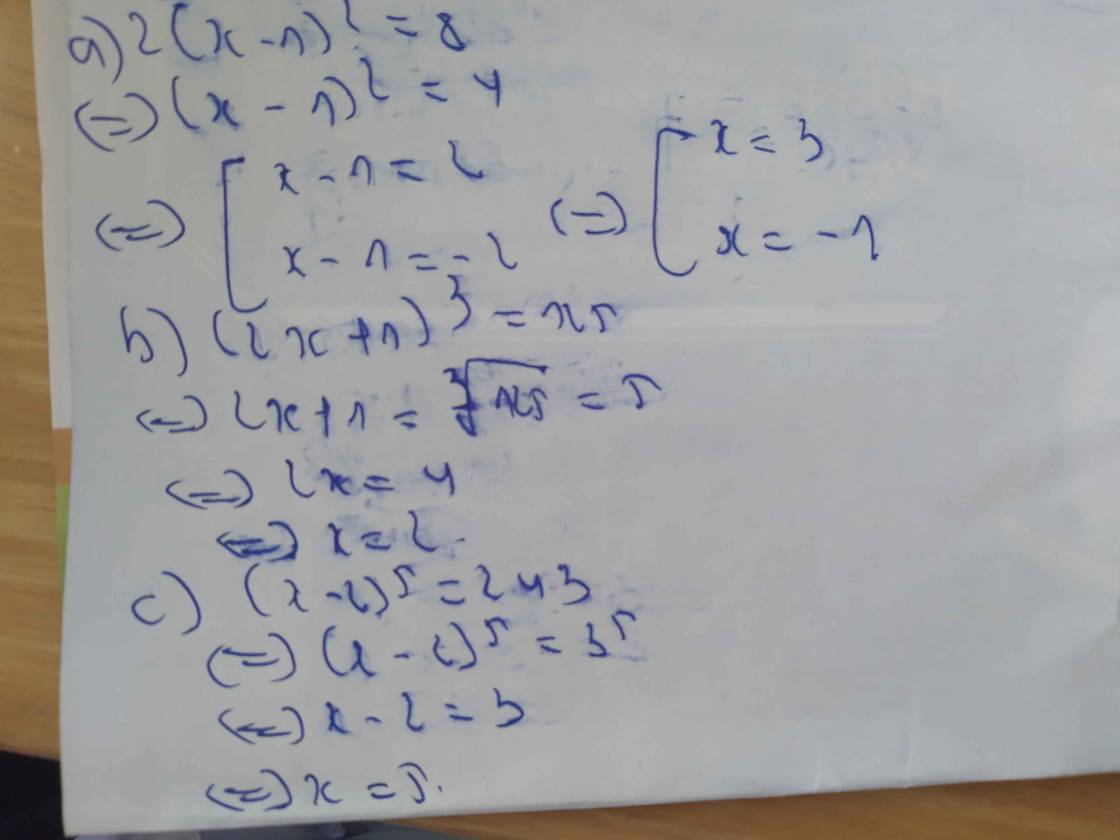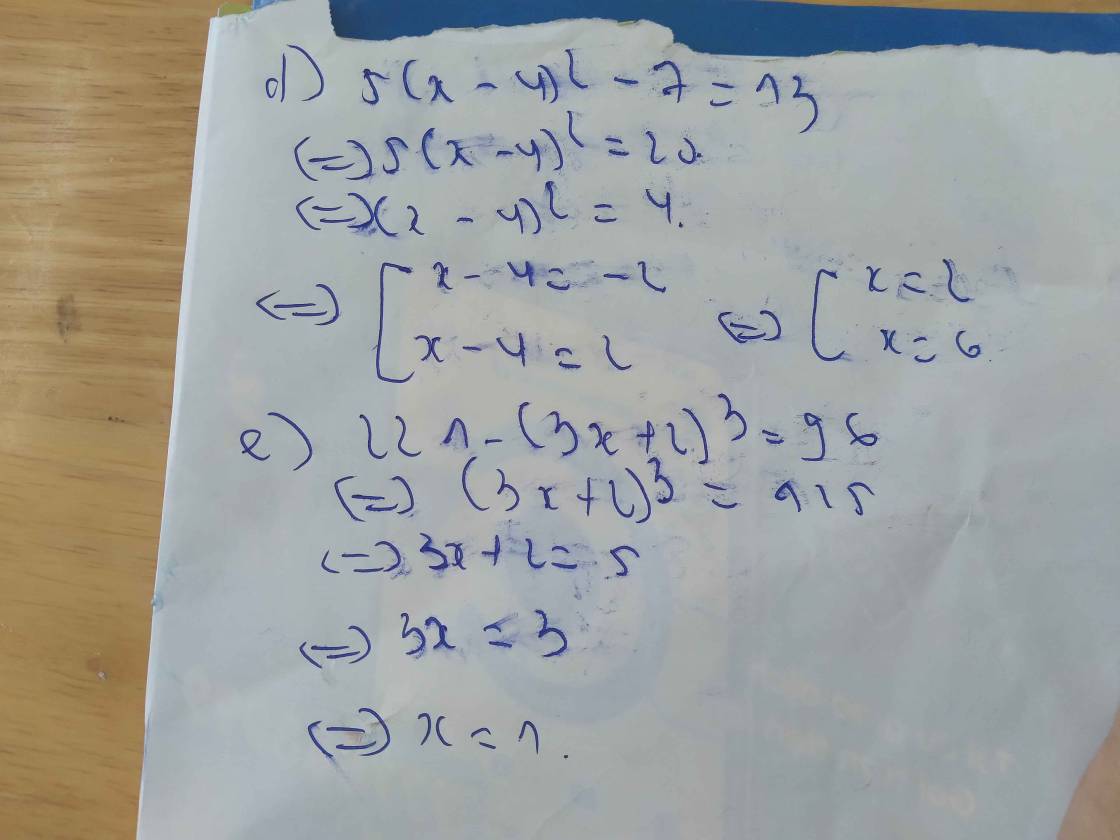Hãy nhập câu hỏi của bạn vào đây, nếu là tài khoản VIP, bạn sẽ được ưu tiên trả lời.

1. \(x⋮12,x⋮10\Rightarrow x\in BC(12,10)\)và -200 < x < 200
Theo đề bài , ta có :
\(12=2^2\cdot3\)
\(10=2\cdot5\)
\(\Rightarrow BCNN(10,12)=2^2\cdot3\cdot5=60\)
\(\Rightarrow BC(10,12)=B(60)=\left\{0;60;-60;120;-120;180;-180;240;...\right\}\)
Mà \(x\in BC(10,12)\)và -200 < x < 200 => \(x\in\left\{0;60;-60;120;-120;180;-180\right\}\)
Học tốt

a: =>2x-1=-2
=>2x=-1
hay x=-1/2
b: \(\Leftrightarrow\left[{}\begin{matrix}3x+2=0\\-\dfrac{2}{5}x-7=0\end{matrix}\right.\Leftrightarrow x\in\left\{-\dfrac{2}{3};-\dfrac{35}{2}\right\}\)
c: x/8=9/4
nên x/8=18/8
hay x=18
d: \(\Leftrightarrow\left(x-3\right)^2=36\)
=>x-3=6 hoặc x-3=-6
=>x=9 hoặc x=-3
e: =>-1,7x=6,12
hay x=-3,6
h: =>x-3,4=27,6
hay x=31
a) \(\dfrac{1}{3}\div\left(2x-1\right)=\dfrac{-1}{6}\)
\(\left(2x-1\right).\dfrac{1}{3}\div\left(2x-1\right)=\left(2x-1\right)\left(-\dfrac{1}{6}\right)\)
\(\dfrac{1}{3}=\left(2x-1\right)\left(-\dfrac{1}{6}\right)\)
\(\dfrac{1}{3}=-1\left(2x-1\right)\div6\)
\(\dfrac{1}{3}=-2x+1\div6\)
\(x=-\dfrac{1}{2}\)
b) \(\left(3x+2\right)\left(\dfrac{-2}{5}x-7\right)=0\)
\(TH1:3x+2=0\)
\(3x=0-2\)
\(3x=-2\)
\(x=\dfrac{-2}{3}\)
\(TH2:\left(-\dfrac{2}{5}x-7\right)=0\)
\(\left(\dfrac{-2}{5}x-7\right)=0\)
\(\left(\dfrac{-2x}{5}+\dfrac{5\left(-7\right)}{5}\right)=0\)
\(\left(\dfrac{-2x-35}{5}\right)=0\)
\(-2x-35=0\)
\(-2x=0+35\)
\(x=-\dfrac{35}{2}\)
c) \(\dfrac{x}{8}=\dfrac{9}{4}\)
\(\Leftrightarrow x=\dfrac{9.8}{4}=\dfrac{72}{4}=18\)
\(x=18\)
d) \(\dfrac{x-3}{2}=\dfrac{18}{x-3}\)
\(x-3=18+2\)
\(x=20-3\)
\(x=17\)
e) \(4,5x-6,2x=6,12\)
\(\dfrac{9x}{2}-6,2.x=6,12\)
\(\dfrac{9x}{2}+\dfrac{-31x}{5}=6,12\)
\(\dfrac{5.9x}{10}+\dfrac{2\left(-31\right)x}{10}=6.12\)
\(\dfrac{45x-62x}{10}=6.12\)
\(=-17x\div10=6.12\)
\(-17x=10.6.12\)
\(x=-3,6\)
h) \(11,4-\left(x-3,4\right)=-16,2\)
\(x-3,4=-16,2+11,4\)
\(x-3,4=-4,8\)
\(x=-1,4\)

a: =>x-3/4=1/6-1/2=1/6-3/6=-2/6=-1/3
=>x=-1/3+3/4=-4/12+9/12=5/12
b: =>x(1/2-5/6)=7/2
=>-1/3x=7/2
hay x=-21/2
c: (4-x)(3x+5)=0
=>4-x=0 hoặc 3x+5=0
=>x=4 hoặc x=-5/3
d: x/16=50/32
=>x/16=25/16
hay x=25
e: =>2x-3=-1/4-3/2=-1/4-6/4=-7/4
=>2x=-7/4+3=5/4
hay x=5/8

a: 18:(x-3)=6
=>x-3=18:6=3
=>x=3+3=6
b: \(3^{x-1}+4=85\)
=>\(3^{x-1}=81\)
=>\(3^{x-1}=3^4\)
=>x-1=4
=>x=5
c: 2x+3x=55
=>5x=55
=>x=55/5=11
d: \(\left(x-3\right)^3+11=53\)
=>\(\left(x-3\right)^3=53-11=42\)
=>\(x-3=\sqrt[3]{42}\)
=>\(x=\sqrt[3]{42}+3\)
a) 18 : (x - 3) = 6
x - 3 = 18 : 6
x - 3 = 3
x = 3 + 3
x = 6
b) 3ˣ⁻¹ + 4 = 85
3ˣ⁻¹ = 85 - 4
3ˣ⁻¹ = 81
3ˣ⁻¹ = 3⁴
x - 1 = 4
x = 4 + 1
x = 5
c) 2x + 3x = 55
5x = 55
x = 55 : 5
x = 11
d) Sửa đề:
(x - 3)³ - 11 = 53
(x - 3)³ = 53 + 11
(x - 3)³ = 64
(x - 3)³ = 4³
x - 3 = 4
x = 4 + 3
x = 7

a)TH1: \(2x-3>0;3x+2>0\)
\(=>2x-3-3x-2=0\\ =>-x-5=0\\ =>-x=5=>x=-5\)
TH2: \(2x-3< 0;3x+2< 0\)
\(=>-2x+3+3x+2=0\\ =>x+5=0\\ =>x=-5\)
Cả 2 TH ra \(x=-5=>x=-5\)
b)TH1 \(\dfrac{1}{2}x>0\)
\(=>\dfrac{1}{2}x=3-2x\\ =>3-2x-\dfrac{1}{2}x=0\\ =>\dfrac{4}{2}x-\dfrac{1}{2}x=3\\ =>\dfrac{3}{2}x=3\\ =>x=2\)
TH2 \(\dfrac{1}{2}x< 0\)
\(=>-\dfrac{1}{2}x=3-2x\\ =>3-2x+\dfrac{1}{2}x=0\\ =>\dfrac{4}{2}x+\dfrac{1}{2}x=3\\ =>\dfrac{5}{2}x=3\\ =>x=\dfrac{6}{5}\)
\(=>x=2;\dfrac{6}{5}\)

a: =>(2x-1)^3=4^12:4^10=4^2=8
=>2x-1=2
=>2x=3
=>x=3/2(loại)
b: 6x+5 chia hết cho 3x-1
=>6x-2+7 chia hết cho 3x-1
=>7 chia hết cho 3x-1
mà x là số tự nhiên
nên 3n-1=-1
=>n=0


a) 2.(x-3) - 3.(x-5) = 4.(3-x) - 18
=> 2x - 6 - 3x + 15 = 12 - 4x - 18
=> 2x - 3x + 4x = 12 - 18 + 6 - 15
3x = -15
x = -5
b) ta có: -2x - 11 chia hết cho 3x + 2
=> -6x - 33 chia hết cho 3x + 2
=> -6x - 4 - 29 chia hết cho 3x + 2
-2.(3x+2) - 29 chia hết cho 3x + 2
mà -2.(3x+2) chia hết cho 3x + 2
=> 29 chia hết cho 3x + 2
=>....
bn tự làm tiếp nha!